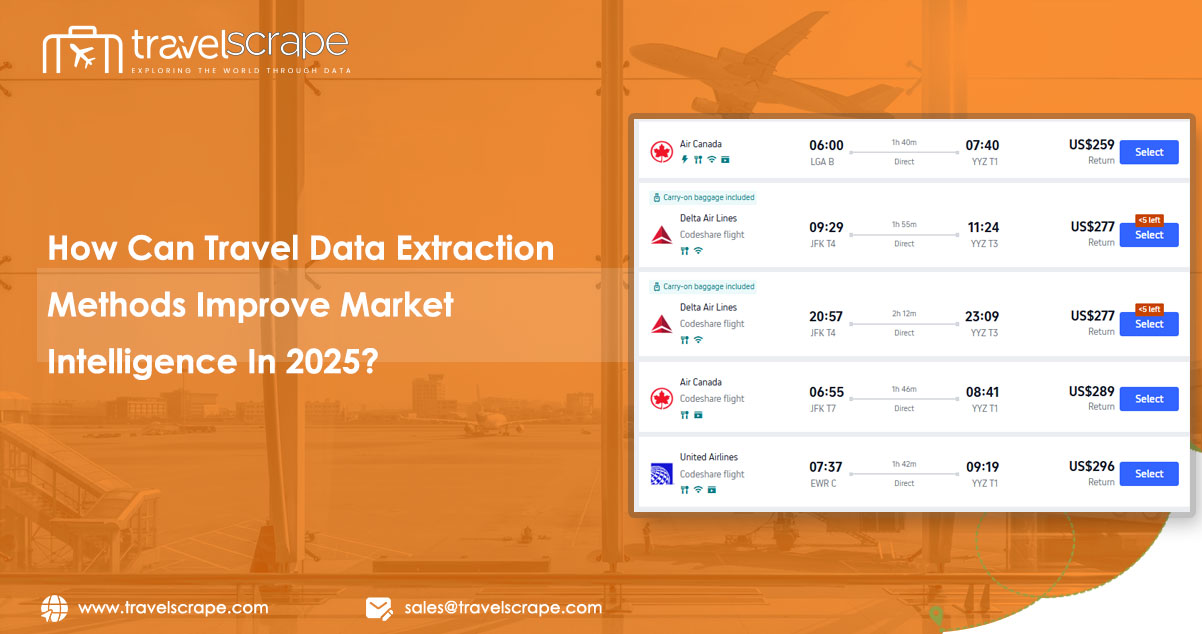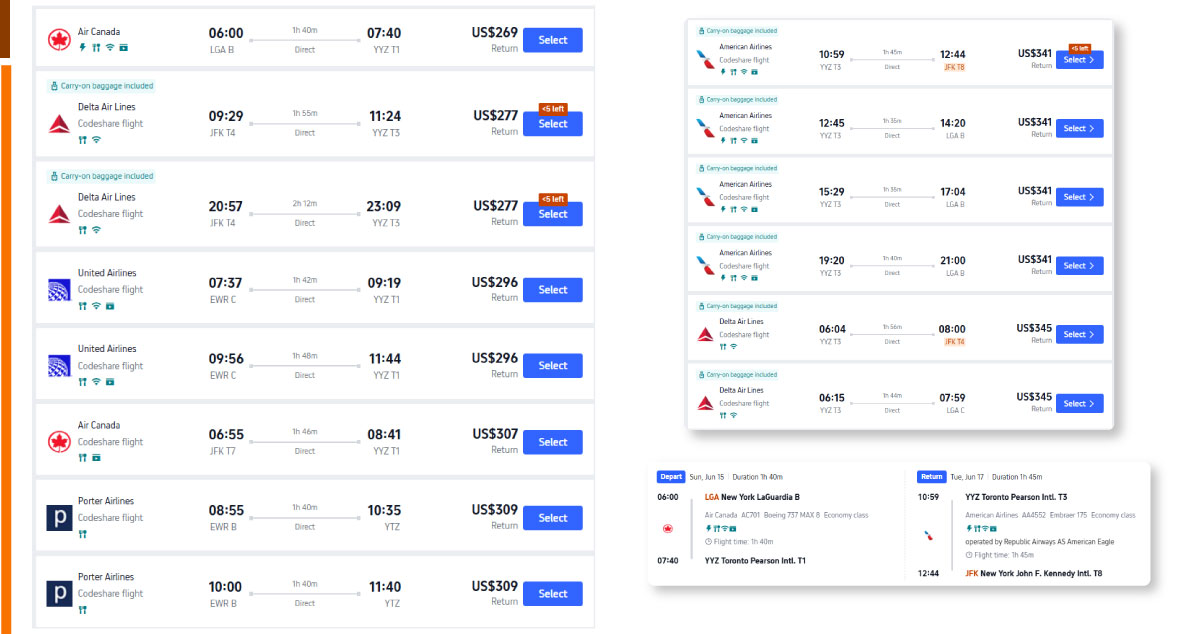How Can Travel Data Extraction Methods Improve Market Intelligence In 2025?

Introduction
The travel industry has transformed tremendously recently, with data becoming the cornerstone of strategic decision-making. As we advance through 2025, businesses increasingly recognize the critical importance of leveraging comprehensive data analytics to stay competitive. Modern companies are discovering that Travel Data Extraction Methods have emerged as fundamental tools that enable them to gather, process, and analyze vast amounts of information from various sources across the travel ecosystem.
The modern travel landscape is characterized by dynamic pricing, evolving consumer preferences, and intense competition among service providers. Traditional market research approaches often fail to provide the real-time insights necessary for effective decision-making in this environment. Companies that successfully implement robust strategies for Market Intelligence In Travel gain significant advantages in understanding customer behavior, pricing trends, and competitive positioning.
Understanding the Evolution of Travel Data Analytics

The travel industry generates enormous amounts of data daily through booking platforms, review sites, social media interactions, and direct customer communications. This wealth of information presents opportunities and challenges for businesses seeking meaningful insights.
Organizations that need to monitor market conditions, track competitor activities, and respond quickly to changing customer demands find that Real-Time Travel Data Scraping has become essential for their operations.
Modern travelers expect personalized experiences, competitive pricing, and seamless booking processes. Meeting these expectations requires sophisticated data analysis capabilities that simultaneously process information from multiple sources.
The infrastructure necessary to collect, clean, and analyze data at scale comes through Travel Data Intelligence Solutions, enabling businesses to make informed decisions based on current market conditions rather than historical trends alone.
The complexity of the travel ecosystem means that valuable data exists across numerous platforms and formats:
- Airline reservation systems with flight schedules and pricing data.
- Hotel booking engines containing availability and rate information.
- Vacation rental platforms showcasing alternative accommodation options.
- Online travel agencies aggregating multiple service providers.
- Review platforms capturing customer feedback and satisfaction metrics.
- Social media channels reveal travel trends and consumer preferences.
Each source contains unique insights contributing to a comprehensive understanding of market dynamics.
Key Components of Modern Travel Data Collection
A structured framework that integrates diverse travel data types to fuel strategic, data-driven decisions across the airline, hospitality, and OTA ecosystems.
Comprehensive Data Source Integration
Successful travel data extraction requires a multi-faceted approach encompassing various data sources throughout the travel value chain. Companies seeking to monitor flight schedules, pricing patterns, route availability, and capacity utilization across different carriers benefit significantly from Airline Data Scraping capabilities.
The hospitality sector presents equally rich data opportunities through systematic collection initiatives. Properties worldwide constantly update their availability, pricing, amenities, and promotional offers across multiple distribution channels. By implementing Hotel Data Scraping processes, businesses can identify pricing trends, assess competitive positioning, and optimize revenue management strategies.
Key data points typically collected include:
- Dynamic pricing fluctuations across different booking windows.
- Seasonal availability patterns and capacity constraints.
- Promotional campaigns and special offer structures.
- Customer review sentiment and rating distributions.
- Geographic demand patterns and market penetration.
- Competitor service offerings and amenity comparisons.
- Revenue management strategies and yield optimization approaches.
Online Travel Agency Intelligence
The rise of online travel agencies has created centralized platforms where vast amounts of travel data converge. Businesses seeking to monitor how different suppliers present their offerings, track promotional strategies, and understand customer booking behaviors across these influential platforms utilize OTA Data Extraction processes to gain comprehensive market visibility.
The short-term rental market operates differently from traditional hospitality, with unique pricing models, booking patterns, and customer expectations. Understanding these dynamics requires specialized data collection and analysis approaches through Vacation Rental Data Analysis that account for local regulations, seasonal demand variations, and host behavior patterns.
Critical insights from OTA platforms include:
- Cross-platform pricing variations and competitive positioning.
- Booking conversion rates and customer journey analytics.
- Marketing campaign effectiveness and promotional impact.
- Inventory distribution strategies across multiple channels.
- Customer preference trends and demographic patterns.
Technology Infrastructure and Implementation Strategies

A strategic framework combining digital systems, API connectivity, and analytics to streamline data access, integration, and insight generation for modern travel businesses.
API Integration and Data Accessibility
Modern travel businesses increasingly rely on structured information interfaces to access data from various service providers. These standardized methods for retrieving data enable more efficient integration with existing business systems through Travel Data APIs that provide consistent access to valuable market information. However, not all valuable data sources offer API access, necessitating alternative extraction methods to capture comprehensive market intelligence.
Implementing effective data extraction systems requires careful consideration of technical requirements, legal compliance, and operational scalability. Organizations must balance the need for comprehensive data coverage with practical constraints related to processing capacity, storage requirements, and analysis capabilities.
Essential technical considerations include:
- Data format standardization and transformation processes.
- Real-time processing capabilities for time-sensitive information.
- Scalable storage solutions for large-volume data sets.
- Quality assurance mechanisms to ensure data accuracy.
- Integration capabilities with existing business intelligence tools.
- Automated monitoring systems for data source availability.
- Backup and recovery procedures for critical data streams.
Advanced Analytics and Machine Learning Applications
The actual value of travel data extraction emerges through sophisticated analysis techniques that transform raw information into actionable insights. Advanced statistical methods and machine learning algorithms help identify patterns, predict future developments, and recommend strategic responses through comprehensive Travel Market Trend Analysis processes.
Machine learning models can process vast amounts of historical and real-time data to identify subtle patterns that might escape traditional analysis methods. These capabilities enable businesses to anticipate market shifts, optimize pricing strategies, and identify emerging opportunities before competitors recognize them.
Advanced analytical capabilities encompass:
- Predictive modeling for demand forecasting and capacity planning.
- Natural language processing for customer sentiment analysis.
- Clustering algorithms for market segmentation and customer profiling.
- Time series analysis for seasonal trend identification.
- Anomaly detection for identifying unusual market conditions.
- Recommendation engines for personalized customer experiences.
Strategic Applications Across Travel Segments
Driving innovation and competitive advantage through targeted data extraction and intelligence-driven travel strategies.
Revenue Management and Pricing Optimization
Comprehensive data extraction enables businesses to monitor competitor pricing strategies in real-time, identify optimal pricing windows, and adjust their strategies accordingly. The analytical framework necessary to process complex pricing data and generate actionable recommendations comes through sophisticated Travel Data Intelligence Solutions that can handle multi-dimensional pricing intelligence.
These systems can identify price elasticity patterns, seasonal demand fluctuations, and competitive responses to pricing changes, enabling more sophisticated revenue management approaches.
Effective pricing intelligence encompasses multiple dimensions:
- Historical pricing patterns and trend analysis.
- Competitive benchmarking across relevant market segments.
- Demand forecasting based on booking velocity and market indicators.
- Event-driven pricing adjustments for exceptional circumstances.
- Customer segment-specific pricing sensitivity analysis.
- Cross-selling and upselling opportunity identification.
- Revenue optimization through dynamic inventory management.
Customer Experience Enhancement
Understanding customer preferences and behavior patterns enables travel businesses to design more compelling offerings and improve service delivery. Data extraction from review platforms, social media, and booking systems provides insights into customer satisfaction drivers, pain points, and emerging expectations. Businesses that need to monitor customer sentiment as it evolves can enable rapid responses to service issues or opportunities for improvement through Real-Time Travel Data Scraping capabilities.
This proactive approach to customer experience management can significantly impact brand reputation and customer loyalty. Modern customer experience optimization relies on continuous feedback loops that capture structured and unstructured customer data.
Key customer experience metrics include:
- Net Promoter Score trends across different touchpoints.
- Customer journey completion rates and abandonment patterns.
- Service quality indicators from review platforms.
- Response time metrics for customer service interactions.
- Personalization effectiveness and engagement levels.
- Cross-channel experience consistency measurements.
Future Trends and Emerging Opportunities

Exploring how advanced technologies and eco-conscious data shape the future of travel intelligence and strategic positioning.
Artificial Intelligence and Predictive Analytics
The integration of artificial intelligence with data extraction continues to evolve, creating new possibilities for predictive analytics and automated decision-making. AI-powered systems can process vast amounts of unstructured data from customer reviews, social media posts, and news articles to identify emerging trends and sentiment shifts. Advanced Travel Data Extraction Methods now incorporate machine learning capabilities that can adapt to changing data patterns and improve extraction accuracy over time.
Strategic business intelligence increasingly relies on these advanced analytical capabilities to provide deeper insights into customer behavior, market dynamics, and competitive positioning. Machine learning algorithms can more accurately identify subtle patterns in booking data, predict demand fluctuations, and recommend optimal pricing strategies than traditional methods.
AI-driven capabilities include:
- Natural language processing for multilingual review analysis.
- Computer vision is used to analyze visual content and destination imagery.
- Predictive modeling for demand forecasting and capacity optimization.
- Automated anomaly detection for identifying market disruptions.
- Intelligent data quality assessment and cleaning processes.
- Dynamic pricing optimization through reinforcement learning.
Sustainability and Environmental Data Integration
Growing environmental consciousness among travelers is creating new data requirements for travel businesses. Companies must track and analyze sustainability metrics, carbon footprint data, and eco-friendly travel options to meet evolving customer expectations and regulatory requirements. Modern approaches to Market Intelligence In Travel now incorporate environmental factors as key variables in market forecasting and strategic planning.
This data requirement expansion presents challenges and opportunities for businesses seeking to position themselves as responsible travel providers. Environmental data collection spans multiple dimensions from transportation emissions to accommodation sustainability practices.
Critical sustainability metrics include:
- Carbon emission calculations for different transportation modes.
- Energy efficiency ratings for accommodation properties.
- Waste reduction and recycling program effectiveness.
- Local community impact assessments and measurements.
- Renewable energy usage across travel service providers.
- Sustainable tourism certification tracking and verification.
Implementation of Best Practices and Success Factors
Effective execution of Travel Data Intelligence depends on a strategic balance of data accuracy, system integration, and organizational readiness. These best practices and success factors help ensure impactful implementation.
Data Quality and Validation
The effectiveness of any data extraction initiative depends heavily on the quality and accuracy of collected information. Implementing robust validation processes ensures that extracted data accurately represents market conditions and can support reliable decision-making. Structured data sources generally provide higher-quality information than unstructured web content. Still, comprehensive market intelligence often requires combining multiple data types and sources through Travel Data APIs and other extraction methods.
Establishing consistent quality standards and validation procedures becomes essential for maintaining data integrity across diverse information sources. Quality management requires automated systems and human oversight to ensure accuracy and relevance.
Critical quality management practices include:
- Automated data validation rules to identify inconsistencies or errors.
- Regular auditing of data sources to ensure continued accuracy and relevance.
- Cross-referencing information from multiple sources to verify authenticity.
- Implementing data cleaning procedures to standardize formats and eliminate duplicates.
- Establishing feedback mechanisms to improve data quality processes continuously.
- Real-time monitoring systems for detecting data source changes or disruptions.
- Version control systems for tracking data lineage and transformation history.
Organizational Integration and Change Management
Companies must develop analytical capabilities, establish decision-making processes incorporating data insights, and create accountability mechanisms for acting on intelligence gathered through extraction processes. Specialized data streams often require domain expertise to interpret correctly and apply strategically through Vacation Rental Data Analysis and other targeted approaches.
Building internal capabilities or partnering with specialized service providers becomes crucial for maximizing the value of extracted data. Successful implementation requires cross-functional collaboration and clear communication channels.
Organizational success factors include:
- Executive sponsorship and strategic alignment with business objectives.
- Training programs for staff to effectively utilize data insights.
- Clear roles and responsibilities for data management and analysis.
- Integration with existing business processes and decision-making frameworks.
- Performance measurement systems that track data utilization and business impact.
- Change management programs to facilitate the adoption of data-driven practices.
Measuring Impact and Return on Investment
Measuring Impact and Return on Investment involves evaluating how data-driven initiatives influence business outcomes through clear, value-focused metrics.
Performance Metrics and Success Indicators
Evaluating the effectiveness of data extraction initiatives requires establishing clear metrics that demonstrate business impact. The volume of data should measure programs collected, the quality of insights generated, and the business value derived from those insights through comprehensive OTA Data Extraction and other systematic collection processes.
Key performance indicators include revenue improvements from optimized pricing strategies, cost savings from more efficient operational decisions, or competitive advantages gained through superior market intelligence. Establishing baseline measurements before implementing data extraction programs enables accurate assessment of program impact over time.
Essential success metrics encompass:
- Revenue growth attributed to data-driven pricing and product decisions.
- Cost reduction achieved through operational efficiency improvements.
- Market share gains resulting from competitive intelligence applications.
- Customer satisfaction improvements are driven by enhanced service delivery.
- Time-to-market acceleration for new products and services.
- Accuracy improvements in demand forecasting and capacity planning.
- Return on investment calculations for data infrastructure investments.
Continuous Improvement and Adaptation
The travel industry's dynamic nature requires continuous refinement of data extraction strategies and analytical approaches. Market conditions, competitive landscapes, and customer preferences evolve constantly, necessitating regular data collection priorities and analysis methodologies updates. Capabilities must adapt to changes in data source structures, platform policies, and technical requirements through Travel Market Trend Analysis and ongoing monitoring processes.
Building flexibility into extraction systems and analytical frameworks ensures continued effectiveness as market conditions change. Agile approaches to data strategy enable rapid responses to new opportunities and challenges.
Adaptation strategies include:
- Regular review and updating of data collection priorities based on business needs.
- Monitoring of data source changes and platform policy updates.
- Investment in scalable infrastructure that can accommodate growth and change.
- Continuous training and development for analytical teams.
- Feedback loops that capture user experiences and improvement opportunities.
- Experimentation with new data sources and analytical techniques.
How Travel Scrape Can Help You?
We provide comprehensive Travel Data Extraction Methods and analysis solutions tailored to the travel industry. Our expertise spans the entire travel ecosystem, enabling clients to access the intelligence they need to make informed strategic decisions.
- Comprehensive Data Coverage: We extract data from airlines, hotels, OTAs, vacation rentals, and other travel platforms to provide complete market visibility.
- Real-Time Processing: Our systems deliver up-to-the-minute data updates, ensuring you have access to current market conditions for timely decision-making.
- Customized Analytics: We develop tailored analysis frameworks that address your business requirements and strategic objectives.
- Scalable Solutions: Our infrastructure adapts to your data needs as your business grows, supporting small-scale projects and enterprise-level implementations.
- Compliance Management: We ensure all data extraction activities comply with relevant legal requirements and platform terms of service.
- Integration Support: Our team provides technical assistance in integrating extracted data with your existing business intelligence and analytics systems.
- Expert Consultation: We offer strategic guidance on how to most effectively leverage travel data for your specific market position and business goals.
Conclusion
The travel industry's evolution demands sophisticated approaches to market intelligence that can process vast amounts of information from diverse sources in real time. Travel Data Extraction Methods provide the foundation for understanding complex market dynamics, competitive positioning, and customer behavior patterns that drive successful business strategies.
Organizations that effectively leverage Travel Aggregators and comprehensive data analysis capabilities position themselves for sustained competitive advantage in an increasingly complex marketplace. Integrating advanced Travel Industry Web Scraping techniques with strategic business intelligence creates opportunities for enhanced decision-making, improved customer experiences, and optimized operational efficiency.
Ready to transform your travel business with comprehensive data intelligence? Contact Travel Scrape today to discover how our specialized travel data extraction solutions can provide the market insights your organization needs to succeed in 2025's competitive landscape.